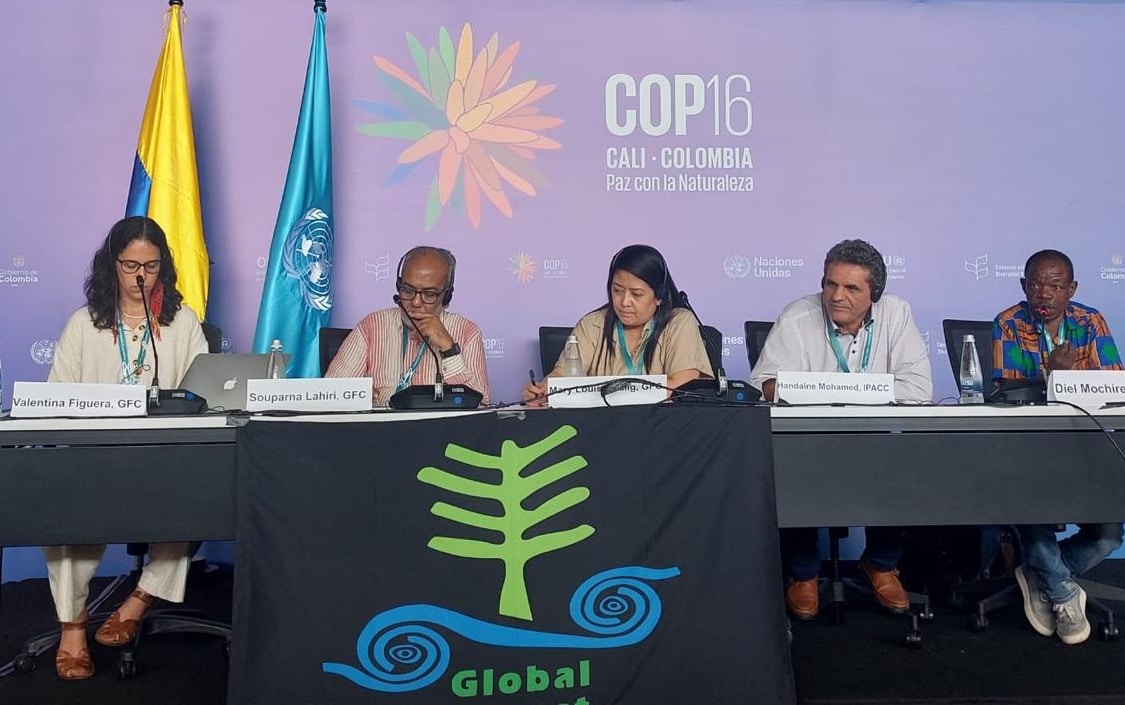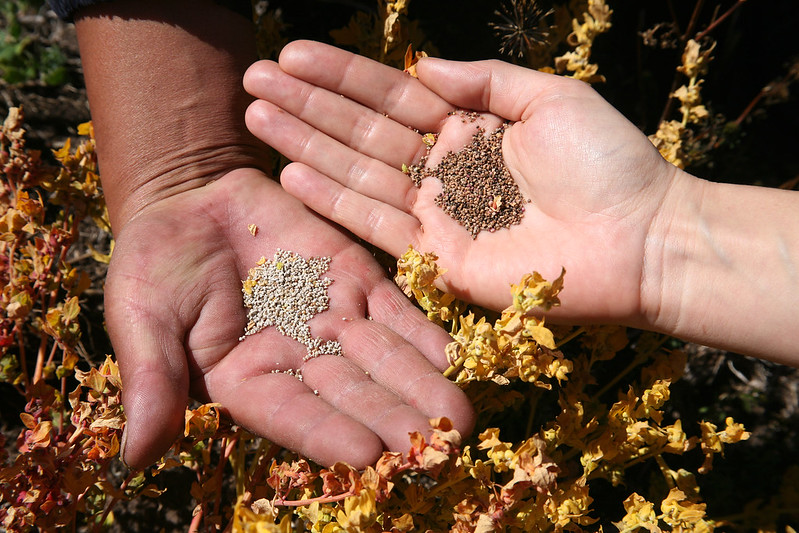Who we are
The Global Forest Coalition (GFC) is an international coalition of over 133 NGOs and Indigenous Peoples’ Organizations defending social justice and the rights of forest peoples in forest policies
The GFC was founded in 2000 by 19 NGOs and Indigenous Peoples’ Organizations (IPOs) from all over the world. It is a successor to the NGO Forest Working Group, which was originally established in 1995. GFC participates in international forest policy meetings and organizes joint advocacy campaigns on issues like Indigenous Peoples’ rights, the need for socially-just forest policy and the need to address the underlying causes of forest loss.

Mission
The mission of the Global Forest Coalition is to advocate for the conservation and restoration of forest ecosystems, through defending and promoting respect for the rights, territories, traditional knowledge and sustainable livelihoods of the Indigenous Peoples, local communities and women that co-exist with them.
Vision
Protect real forests and the people dependent on them. GFC strives for a world where forest ecosystems are protected through sustainable co-existence with the Indigenous Peoples and local communities that call forests home, and where the specific rights, roles, needs and aspirations of women are central to this.
Protect the rights of forest peoples. The rights of Indigenous Peoples, local communities and women must be fully respected and upheld in all forest-related policies, and customary systems of forest governance and conservation, and the territorial rights to land of Indigenous Peoples and local communities, should be fully respected.
Halt deforestation and biodiversity loss. Governments worldwide should comply with their commitment to halt deforestation and forest biodiversity loss, at the latest by 2020. The privatisation, commercialisation and deterioration of public policy, through public-private partnerships and other schemes, should be halted, and governments should guarantee the protection of human rights, particularly for vulnerable groups.
Plantations are not forests. Forest conservation should focus on the preservation, restoration and sustainable use of forests, using indigenous species. Whereas, tree plantations must be excluded from the definition of forests, especially where they are invasive, non-native, commercial and/or monocultures, and thus they are also excluded from subsidies and other forms of financial support intended for reforestation and afforestation.
Forests are not a commodity to be traded; forests are for life. The impacts of the consumption of wood and other forest products must be reduced to a minimum, with sustainable local use governed by local conservation practices prioritised instead.
Forests are key to the climate crisis. Forest protection and restoration should be placed at the heart of climate regulation, to mitigate against the impacts of climate change and to protect biodiversity and halt desertification.
Biodiversity through cultural diversity. The cultural diversity and traditional knowledge of Indigenous Peoples, local communities and women is vital to biodiversity conservation and the protection of forest ecosystems and should therefore be protected, with an emphasis on inter-generational dialogue and the crucial role of young people.
Objectives
To increase public and political awareness of the importance of combating the real, direct and underlying causes of deforestation and forest degradation.
To ensure that the rights of Indigenous Peoples, local communities and women are defended and guaranteed at the territorial level and in national, regional and international policies on forests and other related areas, including biodiversity and climate change.
To protect and promote customary systems of forest governance and conservation, and the traditional knowledge of Indigenous Peoples, local communities and women, to ensure the health of forests and forest biodiversity.
To ensure that community conservation and restoration initiatives have appropriate organisational capacity, and receive sufficient legal, political, technical and financial support.
To increase the capacity of local communities, Indigenous Peoples, social movements and women’s groups to analyse and address the social and environmental impacts of market-based conservation schemes, such as the false solutions that are being promoted within climate policies.
To facilitate and support regional and international alliances of organisations and communities working to defend forests and forest peoples.
History
The Global Forest Coalition was founded in the year 2000 by 19 NGOs and Indigenous Peoples’ Organizations (IPOs) from all over the world. It is a successor to the NGO Forest Working Group, which was originally established in 1995.
In 1997, the NGO Forest Working Group took the lead in the multi-stakeholder initiative to address the underlying causes of deforestation and forest degradation (co-coordinated by the Netherlands Committee for IUCN and the World Rainforest Movement). This initiative published 40 case studies and 20 in-depth studies on the underlying causes of forest loss and organized nine regional and global workshops.
Recognizing the importance of NGOs and IPOs from developing countries participating in international forest policy processes, the members of the NGO Forest Working Group decided to establish the Global Forest Coalition as an inclusive, informal alliance of Southern and Northern NGOs and IPOs.
Until 2005, the Global Forest Coalition was formally hosted by the World Rainforest Movement. In November 2005, the Global Forest Coalition was registered as an independent foundation in the Netherlands.
Meet our Team
For profiles and contact details of our Board of Directors and team members, click here.
Member Groups
The Global Forest Coalition is a coalition of NGOs and Indigenous Peoples’ Organizations aiming for effective, rights-based forest policies. NGOs and IPOs can apply for membership through their respective focal point. As of December 2025, we have 134 members in 75 countries. Visit our members page to see a detailed list of all our members.
Protecting forests, empowering communities, fighting for climate justice
We wholeheartedly thank all who have generously contributed their time and resources to support our campaigns and activities. The opinions expressed in our publications are not necessarily those of our donors.
Your Support Amplifies Community Voices
Help us protect forests, empower communities, and fight for climate justice

